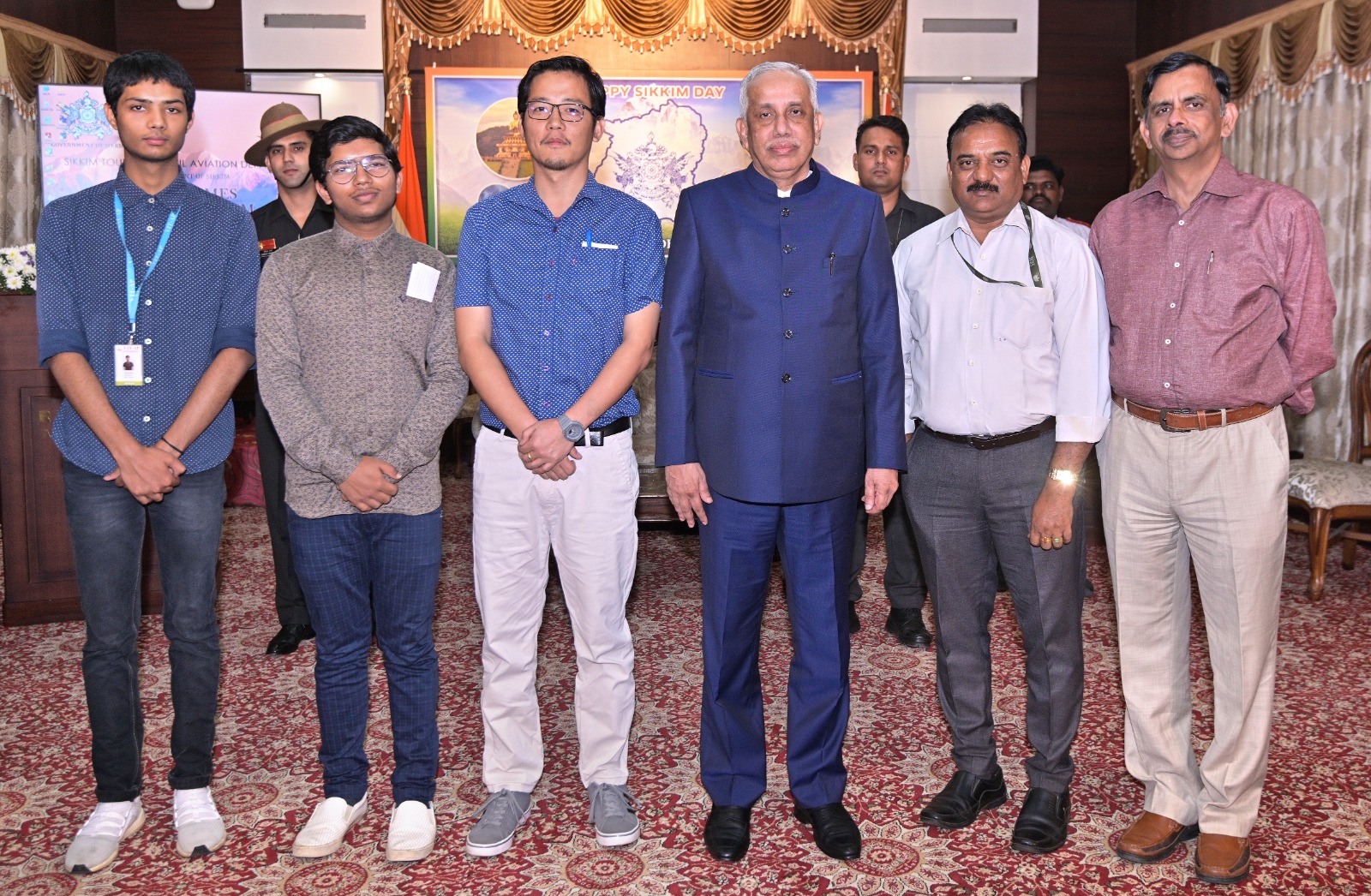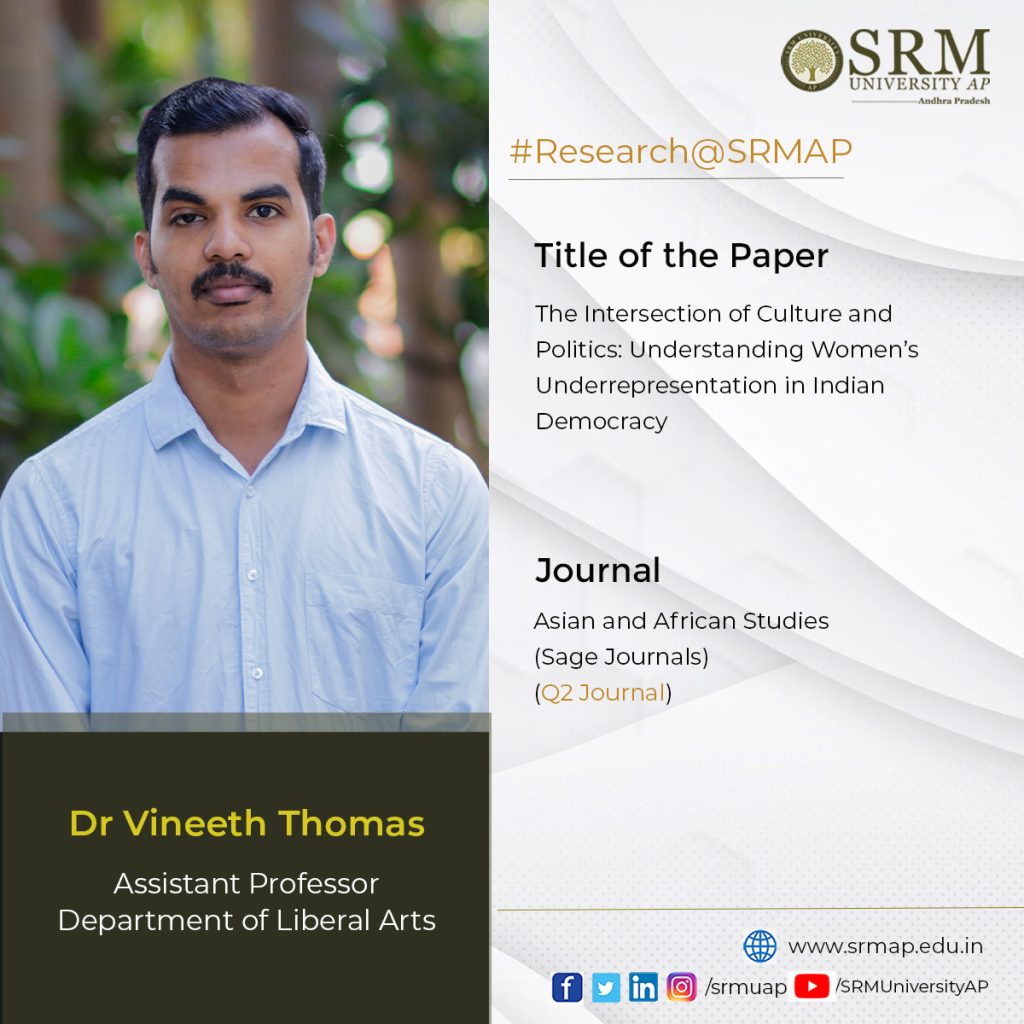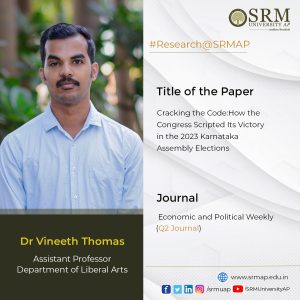Social Support and the Resilience Among Young Adults in Kashmir
 The latest research paper of Dr Aehsan Ahmad Dar, Assistant Professor, Department of Psychology, and Dr Idris Hassan Bhat, Assistant Professor, Department of Liberal Arts, examines the relationship between social support and resilience among young adults in Kashmir who have been exposed to the traumatic events of armed conflicts. His paper titled The Association Between Social Support and Resilience of Young Adults of Kashmir Exposed to Stressful Events of Armed Conflicts and with Their Background Variables was published in the esteemed journal Social Work in Mental Health, which is issued by the reputed publisher Routledge Taylor and Francis.
The latest research paper of Dr Aehsan Ahmad Dar, Assistant Professor, Department of Psychology, and Dr Idris Hassan Bhat, Assistant Professor, Department of Liberal Arts, examines the relationship between social support and resilience among young adults in Kashmir who have been exposed to the traumatic events of armed conflicts. His paper titled The Association Between Social Support and Resilience of Young Adults of Kashmir Exposed to Stressful Events of Armed Conflicts and with Their Background Variables was published in the esteemed journal Social Work in Mental Health, which is issued by the reputed publisher Routledge Taylor and Francis.
Through the research, they found that social support plays a crucial role in enhancing the resilience of young adults and reducing the adverse effects of traumatic experiences. This publication is a significant contribution to the field of social work and mental health, particularly in the context of the ongoing conflict in Kashmir. The findings of the researchers highlight the importance of social support in promoting the mental health and well-being of individuals who have experienced trauma.
Abstract
The current study examined the association of social support and background variables with resilience among young adults exposed to traumatic and stressful events of armed conflict in Kashmir, India. Data were collected from 693 participants using a multi-stage sampling method. Findings revealed that social support and gender were positively associated with resilience, whereas education, income, and maternal education were negatively associated with resilience. Moreover, feeling insecure and psychologically distressed as a result of the conflict was negatively associated with resilience, whereas the perception that the Kashmir conflict would be resolved was positively associated with resilience. The findings suggest fostering resilience in this population.
- Published in Departmental News, Liberal Arts News, News, Psychology News, Research News
Sikkim State Formation Day Celebrations at Raj Bhavan, Andhra Pradesh
 Raj Bhavan, Andhra Pradesh, witnessed celebrations of the 48th Sikkim State Formation Day on May 16, 2023. As per the invitation from the Raj Bhavan officials, Dr Ugen Bhutia, Assistant Professor of the Department of Liberal Arts ; Mr Pankaj Belwariar, Director-Communications; and Mr G Venugopal, Deputy Manager-Communications, met the Honourable Governor of Andhra Pradesh, Sri S Abdul Nazeer. The formation days of different States are being celebrated across the Raj Bhavans in the country to foster the spirit of Ek Bharat Shreshtha Bharat and a greater cultural association between various States and Union Territories.
Raj Bhavan, Andhra Pradesh, witnessed celebrations of the 48th Sikkim State Formation Day on May 16, 2023. As per the invitation from the Raj Bhavan officials, Dr Ugen Bhutia, Assistant Professor of the Department of Liberal Arts ; Mr Pankaj Belwariar, Director-Communications; and Mr G Venugopal, Deputy Manager-Communications, met the Honourable Governor of Andhra Pradesh, Sri S Abdul Nazeer. The formation days of different States are being celebrated across the Raj Bhavans in the country to foster the spirit of Ek Bharat Shreshtha Bharat and a greater cultural association between various States and Union Territories.
‘‘The Government of India, through Article 371(f), provides special protection and conservation to local communities and cultures in Sikkim. People of Sikkim are also going out of the state to pursue education and careers, and this is where the role of other States like Andhra Pradesh and higher education institutes like SRM University-AP becomes relevant”, said Dr Ugen Bhutia as he expressed his gratitude to the respected governor for providing the opportunity to speak about Sikkim on the auspicious occasion. He also commented on how SRM University-AP intends to bring in students and employees from Sikkim and other Northeastern States through various scholarship programmes. This contributes towards the national principle of unity in diversity and national integration.
Sikkim State Formation Day is celebrated on May 16 to commemorate the formation of Sikkim as the 22nd state of the Indian Union in 1975. The state is known for its rich ancient architectural marvels and is one of the essential and integral parts of India. Since merging with the Indian Union, Sikkim has witnessed growth both in terms of social and economic development. Sikkim delivered an exemplary performance in tourism and has established itself as one of the preferred tourist destinations attracting lakhs of tourists each year. In 2016, Sikkim achieved the status of an organic farming state in India. Sikkimese such as Bhaichung Bhutia, a former national football captain and Tarundeep Rai, an Olympian, have established themselves as national pride at the national and international levels. People from different walks of Sikkim participated in the State Formation Day celebrations and shared their views on Sikkim, one of the fastest-growing states in India.
- Published in Departmental News, Liberal Arts News, News
Understanding Women’s Under Representation in Indian Democracy

In an era where numerous policies and measures are taken to give women an equal footing with the rest of the world and where women shoulder equal responsibilities in the family and work front, the representation of women in Indian Politics still lags behind. Dr Vineeth Thomas, Assistant Professor, Department of Liberal Arts in his paper titled- “The Intersection of Culture and Politics: Understanding Women’s Under representation in Indian Democracy” in the Journal of Asian and African Studies – Sage Journals (Q2 Journal) has tried to comprehend the issue of women’s under representation in politics.
Abstract
The representation of women in Indian politics has been low and inadequate, with women comprising only 14.4% of the members of the seventeenth Lok Sabha. Despite numerous policy measures aimed at promoting women’s political representation, the under representation of women remains a persistent challenge. This study seeks to understand the intersection of culture and politics in explaining the under representation of women in Indian democracy. The findings suggest that a change in the civic political culture, through a multifaceted approach, is crucial in breaking down the glass ceiling in Indian politics.
Dr Vineeth Thomas is currently engaged in collaborative research works on Public relations, democracy and ethics, poverty in SAARC region and judicial delay in Indian high courts.
- Published in Departmental News, Liberal Arts News, News, Research News
Cracking the Code: How Congress Scripted Its Victory In 2023 Karnataka Assembly Elections
 Assistant Professor Dr Vineeth Thomas, from the Department of Liberal Arts, has recently made a publication in the Q2 journal called Economic and Political Weekly. The paper titled Cracking the Code: How Congress Scripted Its Victory In 2023 Karnataka Assembly Elections contributes to comprehending and examining the political landscape of Karnataka, shedding light on the various elements that shape voter behaviour and election outcomes within the context of Indian democracy.
Assistant Professor Dr Vineeth Thomas, from the Department of Liberal Arts, has recently made a publication in the Q2 journal called Economic and Political Weekly. The paper titled Cracking the Code: How Congress Scripted Its Victory In 2023 Karnataka Assembly Elections contributes to comprehending and examining the political landscape of Karnataka, shedding light on the various elements that shape voter behaviour and election outcomes within the context of Indian democracy.
Abstract
The Congress party secured a much-awaited thumping majority in the 2023 Karnataka Assembly elections. The election result gave a much-required lifeline to the existential crisis faced by the Congress party and opened the eyes of the BJP to recognise that the Modi-factor and Hindutva card does not always get converted into votes. In this context, this article provides an in-depth analysis of the factors that led to the Congress party’s victory in the 2023 Karnataka assembly elections.
Explanation of the Research in Layperson’s Terms
Due to multiple reasons, it is worth examining the ingredients of Congress’ magical recipe for winning the Karnataka assembly elections. The Congress’ victory in the Karnataka assembly elections in 2023 is a significant political event, as it marked the party’s return to power in the state after a gap of several years. The result provided a new lease of life for the Indian National Congress and it helped to cement the Congress’ position as a key player in the politics of southern India in general and Karnataka in particular. The victory boosts the spirit of Congress party workers on the ground, who are so used to losing that they sometimes give up before the combat even begins. It also allows the party to generate resources in a situation where the Congress controls only three additional states (Himachal Pradesh, Rajasthan and Chhattisgarh). It also enhances the Congress’s profile within the greater national opposition and may persuade some other parties, who have been sceptical of the party’s political judgement and ability, to consider working together. It may help the Congress, which won only one Lok Sabha seat in Karnataka in 2019, to increase its score in 2024. Understanding the components of the Congress’ electoral strategy in Karnataka might therefore provide light on the party’s overall approach to the future assembly and Lok Sabha elections. Examining the reasons that influenced the Congress’ win in Karnataka can give useful insights into India’s larger political scene and shed light on the anticipated outcomes of future elections in the nation.
- Published in Departmental News, Liberal Arts News, News, Research News

